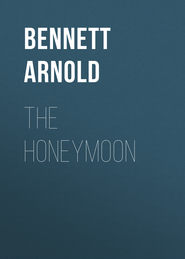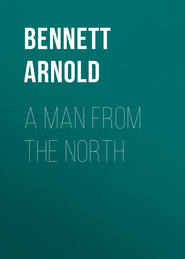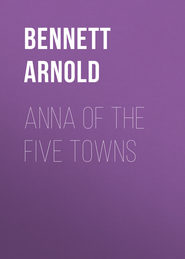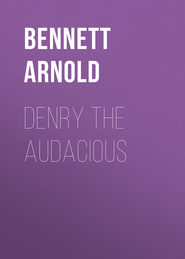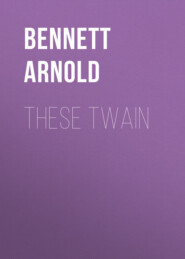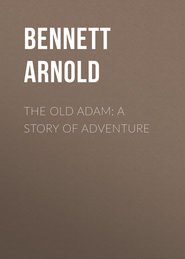По всем вопросам обращайтесь на: info@litportal.ru
(©) 2003-2024.
✖
A Great Man: A Frolic
Настройки чтения
Размер шрифта
Высота строк
Поля
Of course the preposterous lie was credited by nobody.
'There's one thing!' said Mrs. Knight, weeping for the second time that morning. 'I won't have him christened with a black forehead, that I won't!'
At this point, Aunt Annie, who had scurried to the kitchen for some butter, flew back and anointed the bruise.
'It fell out itself!' Tom said again.
'Whatever would the minister think?' Mrs. Knight wondered.
'It fell out itself!' said Tom.
Mr. Knight whipped Tom, and his Aunt Annie put him to bed for the rest of the day. In the settled opinion of Mrs. Knight, Tom was punished for attempting to murder her baby. But Mr. Knight insisted that the punishment was for lying. As for the baptism, it had necessarily to be postponed for four weeks, since the ceremony was performed at the Great Queen Street Chapel only on the first Sunday in the month.
'I never touched it!' Tom asseverated solemnly the next day. 'It fell out itself!'
And he clung to the statement, day after day, with such obstinacy that at length the three adults, despite the protests of reason, began to think that conceivably, just conceivably, the impossible was possible – in regard to one particular baby. Mrs. Knight had often commented on the perfectly marvellous muscular power of her baby's hand when it clutched hers, and signs were not wanting to convince the parents and the aunt that the infant was no ordinary infant, but indeed extraordinary and wonderful to the last degree.
On the fourth day, when Tom had asserted for about the hundredth time, 'It fell out itself,' his Aunt Susan kissed him and gave him a sweetmeat. Tom threw it away, but in the end, after much coaxing, he consented to enjoy it. Aunt Susan detected the finger of Providence in recent events, and one night she whispered to her husband: 'Lovey, I want you to call him what you said.'
And so it occurred, at the christening, that when the minister leaned over the Communion-rail to take the wonder-child from its mother's arms, its father whispered into the minister's ear a double name.
'Henry Shakspere – ' began the minister with lifted hand.
And the baby smiled confidently upwards.
CHAPTER IV
AGED TWELVE
'Quick! He's coming!'
It was Aunt Annie who uttered the dramatic whisper, and as she did so she popped a penknife on to an empty plate in front of an empty chair at the breakfast-table. Mr. Knight placed a silver watch and also, separately, a silver chain by the side of the weapon; and, lastly, Mrs. Knight had the happy inspiration of covering these articles with the empty slop-basin.
The plotters sat back in their chairs and tried to keep their guilty eyes off the overturned basin. 'Two slices, Annie?' said Mr. Knight in a loud tone, elaborately casual. 'Yes, please,' said Aunt Annie. Mrs. Knight began to pour out coffee. They all three looked at each other, joyous, naughty, strategic; and the thing of which they were least conscious, in that moment of expectancy, was precisely the thing that the lustrous trifles hidden beneath the basin were meant to signalize: namely, the passage of years and the approach of age. Mr. Knight's hair was grey; Mrs. Knight, once a slim bride of twenty-seven, was now a stout matron of thirty-nine, with a tendency to pant after the most modest feats of stair-climbing; and Aunt Annie, only the other day a pretty girl with a head full of what is wrongly called nonsense, was a spinster – a spinster. Fortunately, they were blind to these obvious facts. Even Mr. Knight, accustomed as he was to survey fundamental truths with the detachment of a philosopher, would have been shocked to learn that his hair was grey. Before the glass, of a morning, he sometimes remarked, in the tone of a man whose passion for candour permits him to conceal nothing: 'It's getting grey.'
Then young Henry burst into the room.
It was exactly twelve years since he had been born, a tiny, shapeless, senseless, helpless, toothless, speechless, useless, feeble, deaf, myopic creature; and now he was a school-boy, strong, healthy, big, and clever, who could define a dodecahedron and rattle off the rivers of Europe like a house on fire. The change amounted to a miracle, and it was esteemed as such by those who had spent twelve years chiefly in watching it. One evening, in the very earliest stages, while his mother was nursing him, his father had come into the darkened chamber, and, after bending over the infant, had struck a match to ignite a cigar; and the eyes of the infant had blinked in the sudden light. 'See how he takes notice! the mother had cried in ecstatic wonderment. And from that moment she, and the other two, had never ceased to marvel, and to fear. It seemed impossible that this extraordinary fragment of humanity, which at first could not be safely ignored for a single instant night or day, should survive the multitudinous perils that surrounded it. But it did survive, and it became an intelligence. At eighteen months the intelligence could walk, sit up, and say 'Mum.' These performances were astounding. And the fact that fifty thousand other babies of eighteen months in London were similarly walking, sitting up, and saying 'Mum,' did not render these performances any the less astounding. And when, half a year later, the child could point to a letter and identify it plainly and unmistakably – 'O' – the parents' cup was full. The mother admitted frankly that she had not expected this final proof of understanding. Aunt Annie and father pretended not to be surprised, but it was a pretence merely. Why, it seemed scarcely a month since the miraculous child had not even sense enough to take milk out of a spoon! And here he was identifying 'O' every time he tried, with the absolute assurance of a philologist! True, he had once or twice shrieked 'O' while putting a finger on 'Q,' but that was the fault of the printers, who had printed the tail too small.
After that the miracles had followed one another so rapidly, each more amazing than the last, that the watchers had unaffectedly abandoned themselves to an attitude of permanent delighted astonishment. They lived in a world of magic. And their entire existence was based on the tacit assumption – tacit because the truth of it was so manifest – that their boy was the most prodigious boy that ever was. He went into knickerbockers. He learnt hymns. He went to school – and came back alive at the end of the first day and said he had enjoyed it! Certainly, other boys went to school. Yes, but there was something special, something indefinable, something incredible, about Henry's going to school that separated his case from all the other cases, and made it precious in its wonder. And he began to study arithmetic, geometry, geography, history, chemistry, drawing, Latin, French, mensuration, composition, physics, Scripture, and fencing. His singular brain could grapple simultaneously with these multifarious subjects. And all the time he was growing, growing, growing. More than anything else it was his growth that stupefied and confounded and enchanted his mother. His limbs were enormous to her, and the breadth of his shoulders and the altitude of his head. It puzzled her to imagine where the flesh came from. Already he was as tail as she, and up to Aunt Annie's lips, and up to his father's shoulder. She simply adored his colossal bigness. But somehow the fact that a giant was attending the Bloomsbury Middle School never leaked out.
'What's this?' Henry demanded, mystified, as he sat down to breakfast. There was a silence.
'What's what?' said his father gruffly. 'Get your breakfast.'
'Oh my!' Henry had lifted the basin.
'Had you forgotten it was your birthday?' Mrs. Knight asked, beaming.
'Well, I'm blest!' He had in truth forgotten that it was his birthday.
'You've been so wrapped up in this Speech Day business, haven't you?' said Aunt Annie, as if wishful to excuse him to himself for the extraordinary lapse.
They all luxuriated in his surprise, his exclamations, his blushes of delight, as he fingered the presents. For several days, as Henry had made no reference to his approaching anniversary, they had guessed that he had overlooked it in the exciting preparations for Speech Day, and they had been anticipating this moment with the dreadful joy of conspirators. And now they were content. No hitch, no anticlimax had occurred.
'I know,' said Henry. 'The watch is from father, and you've given me the chain, mother, and the knife is from Aunt Annie. Is there a thing in it for pulling stones out of horses' hoofs, auntie?' (Happily, there was.)
'You must make a good breakfast, dear; you've got a big day before you,' enjoined his mother, when he had thanked them politely, and assumed the watch and chain, and opened all the blades and other pleasant devices of the penknife.
'Yes, mother,' he answered obediently.
He always obeyed injunctions to eat well. But it would be unfair to Henry not to add that he was really a most obedient boy – in short, a good boy, a nice boy. The strangest thing of all in Henry's case was that, despite their united and unceasing efforts, his three relatives had quite failed to spoil him. He was too self-possessed for his years, too prone to add the fanciful charm of his ideas to no matter what conversation might be proceeding in his presence; but spoiled he was not.
The Speech Day which had just dawned marked a memorable point in his career. According to his mother's private notion, it would be a demonstration, and a triumphant demonstration, that, though the mills of God grind slowly, they grind exceeding small. For until that term, of which the Speech Day was the glittering conclusion, the surpassing merits and talents of her son had escaped recognition at the Bloomsbury Middle School. He had never reached the top of a form; he had never received a prize; he had never earned pedagogic praise more generous than 'Conduct fair – progress fair.' But now, out of the whole school, he had won the prize for Good Conduct. And, as if this was not sufficiently dazzling, he had also taken to himself, for an essay on 'Streets,' the prize for English Composition. And, thirdly, he had been chosen to recite a Shaksperean piece at the ceremony of prize-giving. It was the success in Composition which tickled his father's pride, for was not this a proof of heredity? Aunt Annie flattered herself on the Good Conduct prize. Mrs. Knight exulted in everything, but principally in the prospective sight of her son at large on the platform delivering Shakspere to a hushed, attentive audience of other boys' parents. It was to be the apotheosis of Henry, was that night!
'Will you hear me, father?' Henry requested meekly, when he had finished the first preparations for his big day, and looked at the time, and cut a piece of skin from the palm of his hand, to the horror of his mother and aunt. 'Will you hear me, father?'
(No! I assure you he was not a detestable little prig. He had been brought up like that.)
And Mr. Knight took Staunton's Shakspere from the bookcase and opened it at Othello, Act I., scene iii., and Henry arose and began to explain to the signiors of Venice in what manner Desdemona had fallen in love with him and he with Desdemona; how he told Desdemona that even from his boyish days he had experienced moving accidents by flood and field, and had been sold into slavery, and all about the cannibals and the – but he came to utter grief at the word Anthropophagi.'
'An-thro-poph-a-gi,' said his father.
'It's a very difficult word, I'm sure,' said his mother.
Difficult or not, Henry mastered it, and went on to the distressful strokes his youth had suffered, and then to Desdemona's coy hint:
'Upon this hint I spoke – spake, I mean;
She loved me for the dangers I had passed,
And I loved her that she did pity them.
This only is the witchcraft I have used.
Here comes the lady; let her witness it.'
'Have a bit of toast, my pet,' Mrs. Knight suggested.
The door opened at the same moment.
'Enter Desdemona,' said a voice. 'Now do go light on the buttered toast, Othello. You know you'll be ill.'
It was Cousin Tom. He was always very late for breakfast.
CHAPTER V
MARRONS GLACÉS
And Tom was always being inconvenient, always producing intellectual discomfort. On this occasion there can be no doubt that if Tom had not come in just then Henry would have accepted and eaten the buttered toast, and would have enjoyed it; and his father, mother, and aunt would have enjoyed the spectacle of his bliss; and all four of them would have successfully pretended to their gullible consciences that an indiscretion had not been committed. Here it must be said that the Achilles' heel of Henry Shakspere Knight lay in his stomach. Despite his rosy cheeks and pervading robustness, despite the fact that his infancy had been almost immune from the common ailments – even measles – he certainly suffered from a form of chronic dyspepsia. Authorities differed upon the cause of the ailment. Some, such as Tom, diagnosed the case in a single word. Mr. Knight, less abrupt, ascribed the evil to Mrs. Knight's natural but too solicitous endeavours towards keeping up the strength of her crescent son. Mrs. Knight and Aunt Annie regarded it as a misfortune simply, inexplicable, unjust, and cruel. But even Mrs. Knight and Aunt Annie had perceived that there was at least an apparent connection between hot buttered toast and the recurrence of the malady. Hence, though the two women would not admit that this connection was more than a series of unfortunate coincidences, Henry had been advised to deprive himself of hot buttered toast. And here came Tom, with his characteristic inconvenience, to catch them in the very midst of their folly, and to make even Mr. Knight, that mask of stern rectitude, a guilty accessory before the fact.
'It's only this once!' Mrs. Knight protested.
'There's one thing!' said Mrs. Knight, weeping for the second time that morning. 'I won't have him christened with a black forehead, that I won't!'
At this point, Aunt Annie, who had scurried to the kitchen for some butter, flew back and anointed the bruise.
'It fell out itself!' Tom said again.
'Whatever would the minister think?' Mrs. Knight wondered.
'It fell out itself!' said Tom.
Mr. Knight whipped Tom, and his Aunt Annie put him to bed for the rest of the day. In the settled opinion of Mrs. Knight, Tom was punished for attempting to murder her baby. But Mr. Knight insisted that the punishment was for lying. As for the baptism, it had necessarily to be postponed for four weeks, since the ceremony was performed at the Great Queen Street Chapel only on the first Sunday in the month.
'I never touched it!' Tom asseverated solemnly the next day. 'It fell out itself!'
And he clung to the statement, day after day, with such obstinacy that at length the three adults, despite the protests of reason, began to think that conceivably, just conceivably, the impossible was possible – in regard to one particular baby. Mrs. Knight had often commented on the perfectly marvellous muscular power of her baby's hand when it clutched hers, and signs were not wanting to convince the parents and the aunt that the infant was no ordinary infant, but indeed extraordinary and wonderful to the last degree.
On the fourth day, when Tom had asserted for about the hundredth time, 'It fell out itself,' his Aunt Susan kissed him and gave him a sweetmeat. Tom threw it away, but in the end, after much coaxing, he consented to enjoy it. Aunt Susan detected the finger of Providence in recent events, and one night she whispered to her husband: 'Lovey, I want you to call him what you said.'
And so it occurred, at the christening, that when the minister leaned over the Communion-rail to take the wonder-child from its mother's arms, its father whispered into the minister's ear a double name.
'Henry Shakspere – ' began the minister with lifted hand.
And the baby smiled confidently upwards.
CHAPTER IV
AGED TWELVE
'Quick! He's coming!'
It was Aunt Annie who uttered the dramatic whisper, and as she did so she popped a penknife on to an empty plate in front of an empty chair at the breakfast-table. Mr. Knight placed a silver watch and also, separately, a silver chain by the side of the weapon; and, lastly, Mrs. Knight had the happy inspiration of covering these articles with the empty slop-basin.
The plotters sat back in their chairs and tried to keep their guilty eyes off the overturned basin. 'Two slices, Annie?' said Mr. Knight in a loud tone, elaborately casual. 'Yes, please,' said Aunt Annie. Mrs. Knight began to pour out coffee. They all three looked at each other, joyous, naughty, strategic; and the thing of which they were least conscious, in that moment of expectancy, was precisely the thing that the lustrous trifles hidden beneath the basin were meant to signalize: namely, the passage of years and the approach of age. Mr. Knight's hair was grey; Mrs. Knight, once a slim bride of twenty-seven, was now a stout matron of thirty-nine, with a tendency to pant after the most modest feats of stair-climbing; and Aunt Annie, only the other day a pretty girl with a head full of what is wrongly called nonsense, was a spinster – a spinster. Fortunately, they were blind to these obvious facts. Even Mr. Knight, accustomed as he was to survey fundamental truths with the detachment of a philosopher, would have been shocked to learn that his hair was grey. Before the glass, of a morning, he sometimes remarked, in the tone of a man whose passion for candour permits him to conceal nothing: 'It's getting grey.'
Then young Henry burst into the room.
It was exactly twelve years since he had been born, a tiny, shapeless, senseless, helpless, toothless, speechless, useless, feeble, deaf, myopic creature; and now he was a school-boy, strong, healthy, big, and clever, who could define a dodecahedron and rattle off the rivers of Europe like a house on fire. The change amounted to a miracle, and it was esteemed as such by those who had spent twelve years chiefly in watching it. One evening, in the very earliest stages, while his mother was nursing him, his father had come into the darkened chamber, and, after bending over the infant, had struck a match to ignite a cigar; and the eyes of the infant had blinked in the sudden light. 'See how he takes notice! the mother had cried in ecstatic wonderment. And from that moment she, and the other two, had never ceased to marvel, and to fear. It seemed impossible that this extraordinary fragment of humanity, which at first could not be safely ignored for a single instant night or day, should survive the multitudinous perils that surrounded it. But it did survive, and it became an intelligence. At eighteen months the intelligence could walk, sit up, and say 'Mum.' These performances were astounding. And the fact that fifty thousand other babies of eighteen months in London were similarly walking, sitting up, and saying 'Mum,' did not render these performances any the less astounding. And when, half a year later, the child could point to a letter and identify it plainly and unmistakably – 'O' – the parents' cup was full. The mother admitted frankly that she had not expected this final proof of understanding. Aunt Annie and father pretended not to be surprised, but it was a pretence merely. Why, it seemed scarcely a month since the miraculous child had not even sense enough to take milk out of a spoon! And here he was identifying 'O' every time he tried, with the absolute assurance of a philologist! True, he had once or twice shrieked 'O' while putting a finger on 'Q,' but that was the fault of the printers, who had printed the tail too small.
After that the miracles had followed one another so rapidly, each more amazing than the last, that the watchers had unaffectedly abandoned themselves to an attitude of permanent delighted astonishment. They lived in a world of magic. And their entire existence was based on the tacit assumption – tacit because the truth of it was so manifest – that their boy was the most prodigious boy that ever was. He went into knickerbockers. He learnt hymns. He went to school – and came back alive at the end of the first day and said he had enjoyed it! Certainly, other boys went to school. Yes, but there was something special, something indefinable, something incredible, about Henry's going to school that separated his case from all the other cases, and made it precious in its wonder. And he began to study arithmetic, geometry, geography, history, chemistry, drawing, Latin, French, mensuration, composition, physics, Scripture, and fencing. His singular brain could grapple simultaneously with these multifarious subjects. And all the time he was growing, growing, growing. More than anything else it was his growth that stupefied and confounded and enchanted his mother. His limbs were enormous to her, and the breadth of his shoulders and the altitude of his head. It puzzled her to imagine where the flesh came from. Already he was as tail as she, and up to Aunt Annie's lips, and up to his father's shoulder. She simply adored his colossal bigness. But somehow the fact that a giant was attending the Bloomsbury Middle School never leaked out.
'What's this?' Henry demanded, mystified, as he sat down to breakfast. There was a silence.
'What's what?' said his father gruffly. 'Get your breakfast.'
'Oh my!' Henry had lifted the basin.
'Had you forgotten it was your birthday?' Mrs. Knight asked, beaming.
'Well, I'm blest!' He had in truth forgotten that it was his birthday.
'You've been so wrapped up in this Speech Day business, haven't you?' said Aunt Annie, as if wishful to excuse him to himself for the extraordinary lapse.
They all luxuriated in his surprise, his exclamations, his blushes of delight, as he fingered the presents. For several days, as Henry had made no reference to his approaching anniversary, they had guessed that he had overlooked it in the exciting preparations for Speech Day, and they had been anticipating this moment with the dreadful joy of conspirators. And now they were content. No hitch, no anticlimax had occurred.
'I know,' said Henry. 'The watch is from father, and you've given me the chain, mother, and the knife is from Aunt Annie. Is there a thing in it for pulling stones out of horses' hoofs, auntie?' (Happily, there was.)
'You must make a good breakfast, dear; you've got a big day before you,' enjoined his mother, when he had thanked them politely, and assumed the watch and chain, and opened all the blades and other pleasant devices of the penknife.
'Yes, mother,' he answered obediently.
He always obeyed injunctions to eat well. But it would be unfair to Henry not to add that he was really a most obedient boy – in short, a good boy, a nice boy. The strangest thing of all in Henry's case was that, despite their united and unceasing efforts, his three relatives had quite failed to spoil him. He was too self-possessed for his years, too prone to add the fanciful charm of his ideas to no matter what conversation might be proceeding in his presence; but spoiled he was not.
The Speech Day which had just dawned marked a memorable point in his career. According to his mother's private notion, it would be a demonstration, and a triumphant demonstration, that, though the mills of God grind slowly, they grind exceeding small. For until that term, of which the Speech Day was the glittering conclusion, the surpassing merits and talents of her son had escaped recognition at the Bloomsbury Middle School. He had never reached the top of a form; he had never received a prize; he had never earned pedagogic praise more generous than 'Conduct fair – progress fair.' But now, out of the whole school, he had won the prize for Good Conduct. And, as if this was not sufficiently dazzling, he had also taken to himself, for an essay on 'Streets,' the prize for English Composition. And, thirdly, he had been chosen to recite a Shaksperean piece at the ceremony of prize-giving. It was the success in Composition which tickled his father's pride, for was not this a proof of heredity? Aunt Annie flattered herself on the Good Conduct prize. Mrs. Knight exulted in everything, but principally in the prospective sight of her son at large on the platform delivering Shakspere to a hushed, attentive audience of other boys' parents. It was to be the apotheosis of Henry, was that night!
'Will you hear me, father?' Henry requested meekly, when he had finished the first preparations for his big day, and looked at the time, and cut a piece of skin from the palm of his hand, to the horror of his mother and aunt. 'Will you hear me, father?'
(No! I assure you he was not a detestable little prig. He had been brought up like that.)
And Mr. Knight took Staunton's Shakspere from the bookcase and opened it at Othello, Act I., scene iii., and Henry arose and began to explain to the signiors of Venice in what manner Desdemona had fallen in love with him and he with Desdemona; how he told Desdemona that even from his boyish days he had experienced moving accidents by flood and field, and had been sold into slavery, and all about the cannibals and the – but he came to utter grief at the word Anthropophagi.'
'An-thro-poph-a-gi,' said his father.
'It's a very difficult word, I'm sure,' said his mother.
Difficult or not, Henry mastered it, and went on to the distressful strokes his youth had suffered, and then to Desdemona's coy hint:
'Upon this hint I spoke – spake, I mean;
She loved me for the dangers I had passed,
And I loved her that she did pity them.
This only is the witchcraft I have used.
Here comes the lady; let her witness it.'
'Have a bit of toast, my pet,' Mrs. Knight suggested.
The door opened at the same moment.
'Enter Desdemona,' said a voice. 'Now do go light on the buttered toast, Othello. You know you'll be ill.'
It was Cousin Tom. He was always very late for breakfast.
CHAPTER V
MARRONS GLACÉS
And Tom was always being inconvenient, always producing intellectual discomfort. On this occasion there can be no doubt that if Tom had not come in just then Henry would have accepted and eaten the buttered toast, and would have enjoyed it; and his father, mother, and aunt would have enjoyed the spectacle of his bliss; and all four of them would have successfully pretended to their gullible consciences that an indiscretion had not been committed. Here it must be said that the Achilles' heel of Henry Shakspere Knight lay in his stomach. Despite his rosy cheeks and pervading robustness, despite the fact that his infancy had been almost immune from the common ailments – even measles – he certainly suffered from a form of chronic dyspepsia. Authorities differed upon the cause of the ailment. Some, such as Tom, diagnosed the case in a single word. Mr. Knight, less abrupt, ascribed the evil to Mrs. Knight's natural but too solicitous endeavours towards keeping up the strength of her crescent son. Mrs. Knight and Aunt Annie regarded it as a misfortune simply, inexplicable, unjust, and cruel. But even Mrs. Knight and Aunt Annie had perceived that there was at least an apparent connection between hot buttered toast and the recurrence of the malady. Hence, though the two women would not admit that this connection was more than a series of unfortunate coincidences, Henry had been advised to deprive himself of hot buttered toast. And here came Tom, with his characteristic inconvenience, to catch them in the very midst of their folly, and to make even Mr. Knight, that mask of stern rectitude, a guilty accessory before the fact.
'It's only this once!' Mrs. Knight protested.






